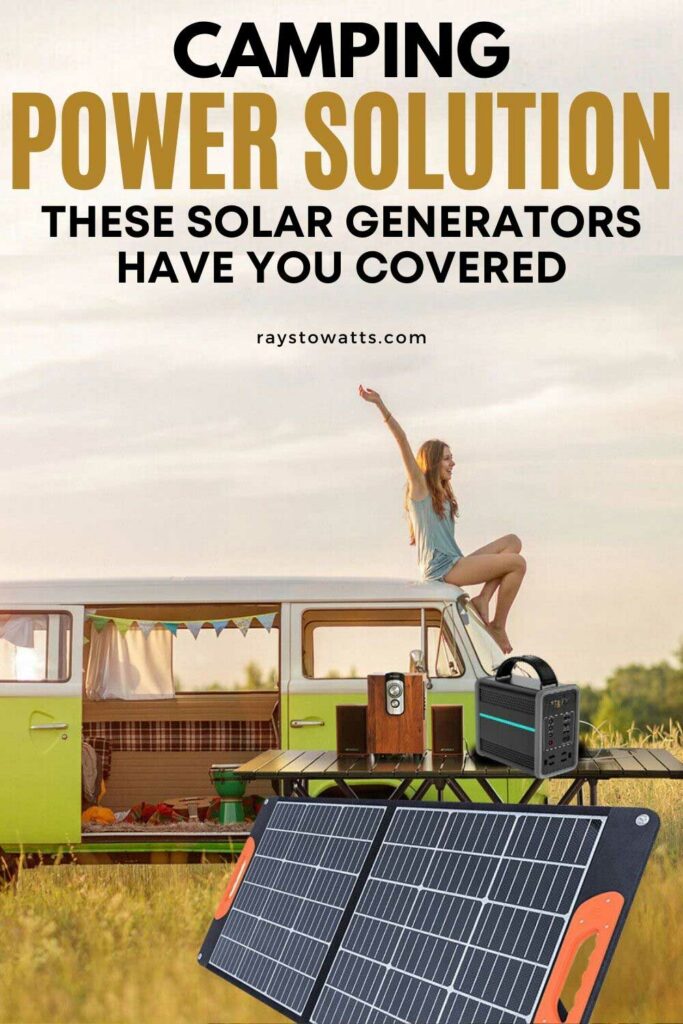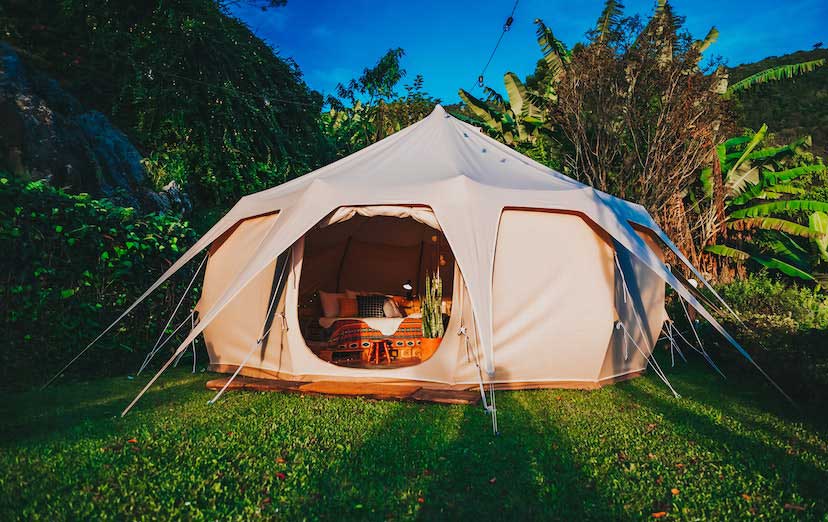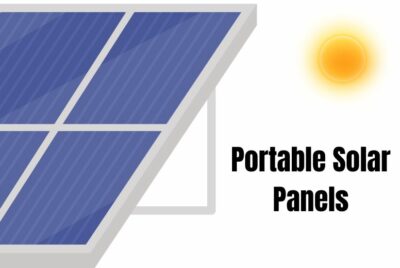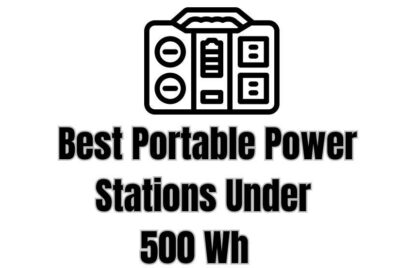The Ultimate Guide to Solar Generators for Camping
I may earn a commission for purchases made through my links. It helps me run this site. Check out my disclosure for more details.
There’s something incredibly liberating about packing up your gear and heading off into the wilderness for a camping trip. The fresh air, the sounds of nature, the starry skies – it’s a much-needed escape from the hustle and bustle of everyday life. But amidst all the excitement, one aspect of camping often poses a challenge – power supply. That’s when a solar generator for camping can be your new best friend.
Whether it’s to charge your phone, light your campsite, or run a portable fridge, having a reliable power source while camping is essential.
Solar generators have emerged as a popular solution to this challenge, offering a perfect blend of convenience, sustainability, and independence from the grid. But with so many options on the market and varying technical specifications, finding the right solar generator can seem daunting. That’s where this comprehensive guide comes in.
We’ve compiled 30 popular questions about the best solar generators for camping, covering everything from how they work, their power capabilities, maintenance, and much more. We aim to provide you with all the information you need to make an informed choice and make the most of your camping experience.
So are you ready to dive in then?
What is a Camping Solar Generator?
A solar generator for camping is a portable power system that harnesses sunlight and converts it into electricity. Well it ain’t specifically a solar generator for camping, but that’s why you came here, so it is very useful when you’re off-grid, either out in the wilds and also when travelling to your destination.
These generators are comprised of solar panels for capturing sunlight, a battery for energy storage, and an inverter to convert the stored energy into a format usable for standard electronics. And solar panels can be attached to your RV and they can also fold up so they can be easily stored and don’t take up much room.
You can station them around your tent. But if the though of setting up solar panels is too much for you, all you have to make sure is that your generator is fully charged before you head off camping. That can of course be done via solar panels at your home, and also via wall outlets. The best thing though about a high capacity solar generator is that it will power your devices for days so you will have plenty of power for a 2-3 day trip without having to recharge your solar generator.
Many camping sites have access to power so you can always get a quick battery top up if you need it. Solar chargers are also portable enough to transport so it will be easy enough bringing them to a recharge point if you get access to grid electricity.
How does a Solar Powered Generator Work?
Photovoltaic panels are used by solar generators to collect solar energy. Following storage in a battery, this energy can power a variety of gadgets. The inverter component transforms the DC (Direct Current) power that is stored into AC (Alternating Current), which is used by the majority of appliances.
The size of the solar generator you need for camping depends on several factors, including the type of appliances you plan to power, the duration of your camping trip, and the availability of sunlight for recharging.
What size of a solar generator do I need for Camping?
- List your power needs – Start by making a list of all the devices or appliances you intend to use during your camping trip. This could include things like lights, smartphones, a laptop, a portable fridge, a camping stove, etc.
- Calculate the total wattage – For each device, find out how many watts it uses per hour. You can usually find this information on the device itself, its power adapter, or in its user manual. Once you have the wattage for each device, calculate the total amount of power you’ll need by multiplying the wattage of each device by the number of hours you plan to use it each day.
- Add some buffer – It’s a good idea to add a buffer of around 20% to your total power need calculation to account for energy losses during power conversion and unforeseen power needs.
- Consider recharging – Remember, your solar generator will need to recharge during the day, so consider the amount of sunlight you can expect during your camping trip. If you’ll be camping in a region or during a season with limited sunlight, you may need a larger generator with more battery capacity to store extra power.
- Battery Capacity – Battery capacity is equally crucial when selecting a solar generator. It is usually measured in watt-hours (Wh) or amp-hours (Ah). A battery with a larger capacity will store more energy and will therefore run your devices for a longer time.
For instance, if your total daily power need (including the 20% buffer) is around 500Wh, you’ll need a solar generator with at least that capacity. Keep in mind this doesn’t account for consecutive cloudy days or heavy usage, so it may be safer to go with a larger capacity if your budget allows.
Note that this is a simplified method and actual power needs can vary based on many factors. Always verify your calculations and the capabilities of a solar generator before purchasing.
| Device/Appliance | Power Consumption (Watts) | Hours Powered by a 500Wh Generator |
|---|---|---|
| Smartphone (average) | 5W | 100 hours |
| Laptop (average) | 50W | 10 hours |
| LED Camp Light (10W) | 10W | 50 hours |
| Portable Mini Fridge (40W) | 40W | 12.5 hours |
| Electric Kettle (800W) | 800W | 0.6 hours (approx 37 minutes) |
| Coffee Machine (600W) | 600W | 0.8 hours (approx 50 minutes) |
| Portable Fan (20W) | 20W | 25 hours |
Please note that power consumption can vary widely based on the specific model and brand of your device or appliance, as well as how you use it. This table is based on averages and should be used as a rough guide.
Also, remember that using high wattage appliances like a kettle or coffee machine will deplete the battery of a 500Wh solar generator quickly. It’s important to manage power use carefully when relying on a solar generator, especially on longer camping trips or in cloudy weather when recharging may be slower.
What are the Best Solar Generators for Camping in 2023?
The best solar generators are characterized by their power output, portability, ease of use, and durability. Some of the premium models in 2023 include the Jackery Explorer range, Goal Zero Yeti range, and EcoFlow range, and Bluetti range. There are also loads of budget options for those not too fussed on brand esteem.
Are Solar Generators Worth the Investment?
The value of a solar generator for camping can be measured in terms of convenience, sustainability, and independence from the power grid. Although the initial cost can be high, the ongoing savings and peace of mind can make the investment worthwhile, particularly for regular campers.
If your devices are constantly running out, or if you have a lot of heat, cooking or cooling needs, and you don’t want to or have access to the grid, well a portable solar generator is a good option. They can charge more devices for a lot longer than power banks.
What is the Battery Range of a Typical Solar Generator?
The battery life of a solar generator can vary widely based on factors such as the model, battery size, the power demand of your devices, and the availability of sunlight. However, many generators can store enough power to last for several hours to a few days.
How do You Charge a Solar Generator While Camping?
Solar generators can be charged by connecting them to their solar panels during daylight hours. Some models also allow for charging via an AC outlet or a car’s 12V socket, making them versatile power solutions for camping trips.
Can a Solar Generator Power All My Camping Equipment?
The ability of a solar generator to power all your camping equipment depends on its power output and the energy requirements of your gear. It’s crucial to add up the total wattage of all your devices and choose a generator that can meet that demand. See above diagram for help.
The small 240Wh E240 generator from Jackery can charge an iPhone 24 times for instance. It won’t power a mini cooler but the E500 by Jackery will power one for 9 hours.
What Factors Should I Consider When Buying a Solar Generator specifically for Camping?
When buying a solar generator for camping, consider factors like power output, battery capacity, portability, durability, and the types of ports available for your devices. Also, consider whether the generator supports solar charging only or also offers other charging options.
How to Maintain a Solar Generator during a Camping Trip?
Maintenance of a solar generator involves regular cleaning of the solar panels, making sure the charging ports aren’t damaged, ensuring the battery is in good condition, and protecting the unit from harsh weather conditions. Always follow the manufacturer’s instructions for best results.
Are Solar Generators Eco-Friendly?
Solar generators are indeed eco-friendly as they rely on renewable solar energy. They emit no harmful greenhouse gases and have minimal environmental impact compared to traditional generators.
How Much Power does a Solar Generator Produce?
Solar generators can produce varying amounts of power depending on their design and size. Small, portable generators might produce between 100-500 watts, while larger units can produce several thousand watts.
What Kind of Appliances can a Solar Generator Power Off-Grid?
Solar generators can power a wide variety of appliances such as lights, smartphones, laptops, small fridges, and even cooking equipment. However, always check the power requirements of your appliances to ensure they’re compatible with your generator’s output.
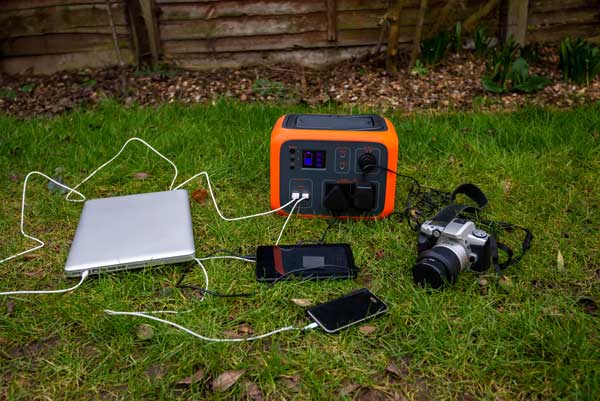
What is the Wattage of a Typical Solar Generator?
The wattage of a solar generator refers to the maximum amount of power it can output at any given moment. This can range from a few hundred watts for smaller generators, to several thousand watts for larger models.
How Long can a Solar Generator Power a Camping Site?
The duration a solar generator can power a camping site depends on the total power demand and the energy storage capacity of the generator. With careful energy management, a good solar generator can power a camping site overnight.
Many larger units can power you for 3-4 days and even up to a week if you manage your power consumption wisely, use it for smaller devices and appliances or take a suitcase solar panel with you, or have access to AC power for recharging.
How Can I Increase the Power Output of My Solar Generator When Camping?
The power output of a solar generator can be increased by using additional or larger solar panels, provided the generator’s charge controller can handle the increased input. Also, positioning your panels to get maximum sunlight can boost power output.
Charging via AC power or your car charger can also keep your solar generators battery topped up.
Can a Solar Generator Power a RV or a Camper Trailer?
Yes, many solar generators are capable of powering an RV or camper trailer, at least for basic needs like lighting, charging devices, and running small appliances. However, for energy-intensive appliances like air conditioners or large fridges, you may need a larger, more powerful generator.
What’s the Power Storage Capacity of a Solar Generator?
The power storage capacity of a solar generator is determined by its battery size. This can range from a few hundred watt-hours for small portable units, to several kilowatt-hours for larger generators.
Can a Solar Generator Provide Enough Power for Heating and Cooling When Camping?
While some solar generators can power small heating or cooling devices, most are not designed to handle the high power demands of larger heating or air conditioning units. Always check the power requirements of your heating or cooling devices against the generator’s output capacity.
How does Sunlight Intensity Affect the Power Generation of a Solar Generator?
Sunlight intensity significantly affects the power generation of a solar generator. More intense sunlight leads to more energy production. Therefore, solar generators are most effective in sunny conditions and during the peak sunlight hours of the day.
How does a Solar Generator Store and Release Power?
Solar generators store energy in a built-in battery, which is charged during the day as the solar panels collect sunlight. The stored energy is then released as electricity through an inverter when devices are plugged into the generator.
You can charge your generator before leaving for your trip if you don’t want to bring solar panels.
Is a Solar Generator Reliable in All Weather Conditions?
Solar generators are most effective in sunny weather. However, they can still generate power in overcast conditions, albeit less efficiently. Most generators are designed to withstand various weather conditions, but it’s best to protect them from rain or severe weather to maintain their lifespan.
How Much Does a Good Solar Generator Cost?
The cost of a good solar generator for camping can vary significantly, from a few hundred dollars for small, portable models, up to a few thousand for larger, high-output units. Consider your power needs and budget when choosing a generator.
What are Some Lightweight Solar Generators Suitable for Backpacking?
Several lightweight and compact solar generators are perfect for backpacking, such as the Jackery Explorer 160 (less than 7 pounds), Goal Zero Yeti 200X (less than 5 pounds), and if you are alright with 45 pounds the Anker Powerhouse 200 is a good choice because it has 1500W of power, which will offer you a substantial bit more of power for a short camping trip
What’s the Lifespan of a Solar Generator?
The lifespan of a solar generator largely depends on the quality of its components and how well it’s maintained. With proper care, most solar generators should last several years, if not a decade or more.
Are There Any Solar Generators Specifically Designed for Camping?
Yes, many solar generators are designed with camping in mind. These models tend to be portable and rugged, with features like carrying handles, weather-resistant casings, and multiple output ports for different devices. Anything that is portable enough for you to carry is ideal, but you also have to weight up how much you are prepared to carry with the price, and how much power you would need. If you have a lot of kids or people in your camp the most lightweight low powered generator may not cut it.
The largest portable power station may also take up too much room, or be too awkward to carry. So you have to literally weight up the options. Me personally i’d go large all day and squeeze in a beast somehow.
Can I Use My Camping Solar Generator at Home During a Power Outage?
Absolutely. One of the great advantages of solar generators is their versatility. While they’re perfect for camping, they can also be used at home during power outages, or any time you need an independent power source.
How do I Troubleshoot Common Problems with a Solar Generator During Camping?
Most issues with solar generators can be resolved by checking the connections, cleaning the panels, ensuring the battery is holding a charge, and making sure the generator isn’t overloaded. If problems persist, refer to the manufacturer’s guide or contact their support team.
Can a Solar Generator Power up My Portable Fridge or Cooler?
Yes, many solar generators can power portable fridges or coolers, as long as the generator’s power output meets the appliance’s power demand. Check the fridge or cooler’s power requirements and ensure your generator can meet them before you head out on your camping trip.
Is it Safe to Use a Solar Generator When Camping in the Rain?
While most solar generators are built to withstand various weather conditions, it’s best to protect them from direct exposure to rain to prevent damage. Some generators may be water-resistant, but few are fully waterproof.
How Much Solar Power do I Need for a Week of Camping?
The amount of solar power you need for a week of camping depends on your power consumption. Calculate the power demand of all your devices and consider the hours you’ll use them. Also, remember that the actual power generation will depend on sunlight availability. As a rule of thumb, it’s better to have more power than you think you’ll need.
If you where to meet the demands of a week long power trip you would definitely need some foldable briefcase solar panels at least one anyway. A car charger would be great, and access to grid power at least once in the week can go a long way. You would ideally be looking for a 3000Wh generator, but a 6000Wh generator would be absolutely perfect. I’m thinking of the Yeti 6000X.
Round-Up
In conclusion, solar generators for camping are a reliable, eco-friendly power solution. They offer independence from the grid, making your camping experience more enjoyable. Remember to consider your power needs, the generator’s capacity, and weather conditions when planning your camping trip. With proper selection and maintenance, a solar generator can be a great investment for all your outdoor adventures.
